Mississippi elected its member August 5–6, 1822.
| District | Incumbent | This race | |||
|---|---|---|---|---|---|
| Member | Party | First elected | Results | Candidates | |
| Mississippi at-large | Christopher Rankin | Democratic-Republican | 1819 | Incumbent re-elected. |
|
| Elections in Mississippi |
|---|
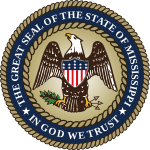 |
Mississippi elected its member August 5–6, 1822.
| District | Incumbent | This race | |||
|---|---|---|---|---|---|
| Member | Party | First elected | Results | Candidates | |
| Mississippi at-large | Christopher Rankin | Democratic-Republican | 1819 | Incumbent re-elected. |
|
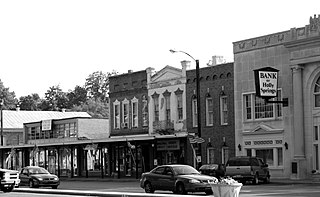
Holly Springs is a city in and the county seat of Marshall County, Mississippi, United States, at the border with southern Tennessee. Near the Mississippi Delta, the area was developed by European Americans for cotton plantations and was dependent on enslaved Africans. After the American Civil War, many freedmen continued to work in agriculture but as sharecroppers and tenant farmers.
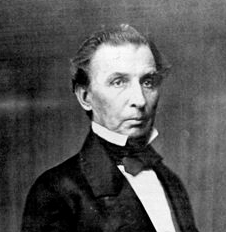
William Lewis Sharkey was an American judge and politician from Mississippi.

The 15th United States Congress was a meeting of the legislative branch of the United States federal government, consisting of the United States Senate and the United States House of Representatives. It met in the Old Brick Capitol in Washington, D.C. from March 4, 1817, to March 4, 1819, during the first two years of James Monroe's presidency. The apportionment of seats in the House of Representatives was based on the Third Census of the United States in 1810. Both chambers had a Democratic-Republican majority.
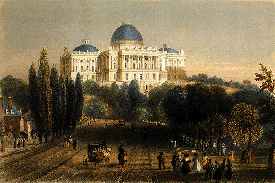
The 17th United States Congress was a meeting of the legislative branch of the United States federal government, consisting of the United States Senate and the United States House of Representatives. While its term was officially March 4, 1821, to March 4, 1823, during the fifth and sixth years of James Monroe's presidency, its first session began on December 3, 1821, ending on May 8, 1822, and its second session began on December 2, 1822, to March 3, 1823. The apportionment of seats in the House of Representatives was based on the third Census of the United States in 1810. Both chambers had a Democratic-Republican majority.

Walter Daniel Leake served as a United States Senator from Mississippi (1817–1820) and as third Governor of Mississippi (1822–1825). He was the first Governor of Mississippi to die in office.

George Poindexter was an American politician, lawyer and judge from Mississippi. Born in Virginia, he moved to the Mississippi Territory in 1802. He served as United States Representative from the newly admitted state, was elected as Governor (1820–1822), and served as a United States Senator.
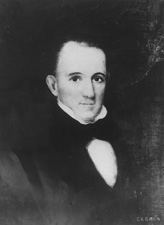
Arthur Pendleton Bagby was the tenth Governor of the U.S. state of Alabama from 1837 to 1841. Born in Louisa County, Virginia, in 1794, he studied law and was admitted to the bar in 1819, practicing in Claiborne, Alabama. He was a member of the Alabama State House of Representatives in 1821, 1822, 1824, and 1834–1836, serving as the youngest-ever speaker in 1822 and 1836, and he served in the Alabama State Senate in 1825. He served in the U.S. Senate from November 21, 1841, when he was elected to fill the vacancy caused by Clement C. Clay's resignation, to June 16, 1848, when he resigned to become Minister to Russia from 1848 to 1849.
From 1822 to 1849, Augusta College was located in Augusta, Kentucky in Bracken County. It was formed when the Bracken Academy and Methodist churches of Ohio and Kentucky joined. Augusta College was the third Methodist college founded in the United States. Its first president was Martin Ruter, D.D. It usually had enrollment of about 175–305 pupils.
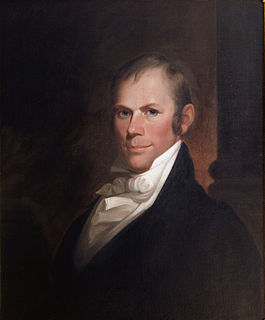
Elections to the United States House of Representatives for the 18th Congress were held at various dates in different states between July 1822 and August 1823 during President James Monroe's second term.

Elections to the United States House of Representatives for the 15th Congress were held at various dates in different states between April 1816 and August 1817.

Elections to the United States House of Representatives for the 10th Congress were held at various dates in each state between April 29, 1806 and August 4, 1807 during Thomas Jefferson's second term with the new Congress meeting on October 26, 1807.

Zadok Casey was an American politician who served as a U.S. Representative from Illinois and founded the city of Mount Vernon.
Cowles Mead was a United States Representative from Georgia. Born in Virginia, he received an English education and became a private practice lawyer.
Robert Whyte Roberts was a U.S. Representative from Mississippi.
Andrew Robison Govan was a U.S. Representative from South Carolina.
David C. Dickson was a state legislator, Mississippi Secretary of State, Lieutenant Governor of Mississippi and a U.S. Representative from Mississippi.

Elections are held periodically in the US state of Mississippi.
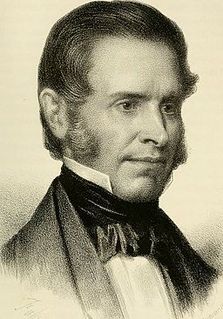
Peleg Sprague was a United States Representative and a United States Senator from Maine and a United States District Judge of the United States District Court for the District of Massachusetts.

Pennsylvania gained three seats in reapportionment following the 1820 United States Census. Pennsylvania elected its members October 8, 1822.
The 1822 United States elections occurred in the middle of Democratic-Republican President James Monroe's second term, and was the last election of the First Party System. Members of the 18th United States Congress were chosen in this election. The 1820 census added 26 seats to the House. Democratic-Republicans continued to dominate both chambers of Congress.